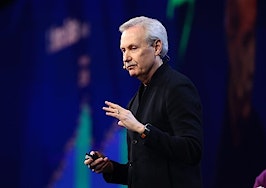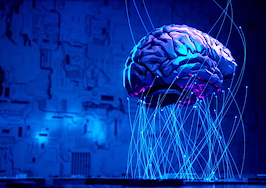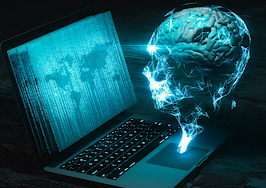I’ve always loved science fiction, but it seems like in the past few months we’ve dove head-first into the future. Between the promise of a dystopian paradise breaking ground at project NEOM in Saudi Arabia to what feels like the rapid onset of advancements in artificial intelligence, we are approaching near-Jetson status.
Weeks ago, as curious entertainment, I loaded my photo into lensa.ai to see how AI would interpret my image. Today, I’m scratching my head about the potentiality of where this could lead us as creatives, as marketing experts, as the real estate industry and also as a civilization.
I’m not alone in this concern. Tech futurists like Elon Musk are sounding alarms and raising the red flag, according to numerous articles. He was recently quoted in Forbes saying, “AI safety is paramount, and without it, we’re toast.”
Toasty?
So why would we be toast with AI? This question led me to Marki Lemons Ryhal, a real estate expert, speaker and trainer, who is teaching about ChatGPT and how to leverage AI for the real estate industry. She is an early adopter of the tech because she wanted to “own her avatar before someone else did.”
In fact, she has created a virtual training avatar with Synthesia, which she refers to as her alter ego. This avatar can speak any language so her training platform has instantly become globally accessible, which is amazing.
She also has created a deep fake for her voice with Descript.com, which she has trained to sound exactly like her. She sends a script, and within 3-5 minutes, she receives an audio file of her deep fake audio avatar reading it back to her.
She has literally extended her reach and her ability to produce more content than ever before, extending her personal brand.
But this tech isn’t all roses, and Marki knows it. The potential for error and the implications for violating licensing and fair housing laws are real. So she checks and double-checks everything that is being created.
She knows that her human and emotional intelligence are more critical than ever when she’s outsourcing some of the content creation to her avatars. She also makes a clear distinction between Avatar Marki and Human Marki for full transparency and integrity.
Weaving stories
Artificial intelligence is pulling and weaving together content from sources that have already been created digitally. This presents interesting challenges regarding plagiarism, ownership, licensing and accuracy.
As we all know, just because something has been created online doesn’t mean it’s factually correct. The possibility for error and missteps are great. Even Google knows this all too well as they were racing to compete with ChatGPT with its AI solution, Bard. During the demo, the AI chatbot answered one of the questions incorrectly on stage, directly costing Google $100 billion in market value.
For most technologists, including Marty Martin, CEO at LOCOMOTIVE Agency, there is no doubt that Google will be the inevitable winner, despite its initial failure. “With access to email, search engines, Google Docs, voice search, and an unprecedented amount of natural language generation data, it would be nearly impossible to compete.”
He believes this is the primary reason why ChatGPT is giving the product away for free, so users can help train the algorithms by feeding more information for learning, essentially giving up our own IP in the process. What’s that famous saying? “When you’re not paying for the product, you are the product?”
Keep your CRM close
If a real estate agent’s most precious resource is their client list and their most valuable asset is their time, doesn’t it make sense to offload tasks to a bot? I think the answer becomes murky; it depends, especially when short-term gains create longer-term problems.
Martin, also an SEO expert, reminds us that bots like ChatGPT, leave a notable fingerprint with their content but are not discernable to the reader. Therefore, surely the search algorithms will be able to scan and find bot-written content and rank it accordingly.
So website content, digital articles and published content should definitely have a human touch. He suggests using AI to assist with outlines and circumvent writers’ block, but not replace the artistry and insight of the human voice and experience.
He states, “You have to use it as a tool and not a solution. It’s a way to shortcut the process but not rely on it.” After all, your unique perspective in real estate, your voice, and your lens of how you perceive the world are the exact differentiations needed to attract the right clients to you.
Finding your people, and then serving them well so they will refer you to more of their people, is the ultimate goal in real estate — and few agents do this well. Let’s face it, juggling the multitude of tasks of past, current and future clients to maintain a healthy real estate business is hard work.
This is why so many agents seek solutions to ease the very heavy load of day-to-day maintenance. One way to ease this burden is to leverage AI and predictive analytics algorithms to digest and interpret hundreds of thousands of data points to surface likely movers within an organization’s existing database.
This allows accurate segmentation of people to ensure time is spent on the most likely people to need real estate services in the very near future. This AI capability virtually extends time and budget by eliminating unnecessary spending and laser-focuses marketing efforts.
Is there a downside to this type of AI? Possibly, but unlike ChatGPT, which likely has content errors based on wrong input, predictive AI’s potential pitfalls are caused when the humans using the tech don’t properly leverage the insights and do nothing.
Check yourself before you wreck
Unchecked and unregulated AI has the potential to blur the lines of authorship and ownership, at the very least. Perhaps the less obvious reason to proceed with caution is ownership of your voice and not abdicating your unique expertise and value to a bot.
This is your IP. Remember always to add context and insight to the content, and never underestimate the power of heart-centered communications to make meaningful and lasting connections.
Leveraged well, AI plus human and emotional intelligence could potentially be a beautiful “yes-and” tool to assist the creative process — but certainly not replace it.
Molly McKinley, co-founder of Redtail Creative, Intentionaliteas and author of The Intentional Business: A Path to Purpose & Prosperity, is an expert at connecting the dots. She is a serial entrepreneur, public relations and integrated marketing strategist with over 25 years of experience launching new products and brands.













